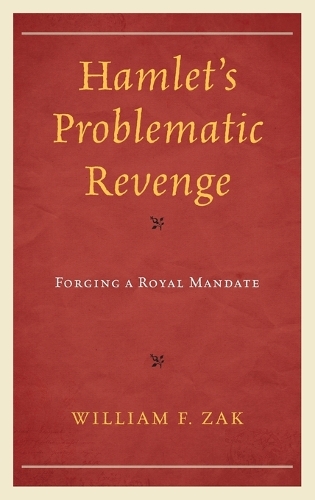
Hamlet's Problematic Revenge: Forging a Royal Mandate
(Hardback)
Available Formats
Publishing Details
Hamlet's Problematic Revenge: Forging a Royal Mandate
By (Author) William F. Zak
Bloomsbury Publishing PLC
Lexington Books
20th May 2015
United States
Classifications
Tertiary Education
Non Fiction
Literary studies: c 1600 to c 1800
Literary studies: general
822.33
Physical Properties
Hardback
150
Width 159mm, Height 236mm, Spine 16mm
363g
Description
Hamlet's Problematic Revenge: Forging a Royal Mandate provides a new argument within Shakespearean studies that argues the oft-noted arrest of the plays dramaturgical momentum, especially evident in Hamlets much delayed enactment of his revenge, represents in fact a succinct emblem of the arrested development in the moral maturity of the entire cast, most notably, Hamlet himselfas the unifying disclosure and tragic problem in the play. Settling for unreflective and short-sighted personal gratifications and cold comforts, they truantly elbow aside a more considerable moral obligation. Again and again, all yield this dutys commanding priority to a childishly self-regarding fear of offending those in nominal positions of power and questionable positions of authorityfigures, like Ophelia and Hamlets fathers, for instance, demanding an unworthy deference. While Hamlet fails to consider with loving regard the improved well-being of the larger community to which he owes his existence and, fails to interrogate the moral adequacy of the Ghosts command of violent reprisal (two things he never does nor even contemplates doing), all occasions in the play do inform against him and merely spur a dull revengenot, as he interprets his own words, arguing the need for greater urgency in his vendetta, but, instead, to inform against the criminality of that very course itself. His revenge therefore can be argued as dull, not because he cannot summon the wherewithal to enact it more bloodily, but because in obsessing about it ceaselessly he remains unreceptive to its dull or unenlightened opposition to the evil he hopes to eradicate. Hamlet does not avenge his father; this book argues that he becomes him. Amidst a wealth of previously unremarked figurative mirrorings, as well as much of the seemingly digressive material in Hamlet within Shakespearean studies, Hamlets Problematic Revenge brings to light a new interpretation of the tragic problem in the play.
Reviews
Romantic-period thinkers loved Hamlet for his obdurate questionings; T. S. Eliot thought he lacked an objective correlative. The protagonist of Shakespeares tragedy now seems rehabilitated, but Zak is a sharp dissenter. He pokes holes in all the arguments of Hamlet adulators, portraying the Danish prince as self-centered, prone to 'risk both his private and the public's good,' and having an 'unacknowledged beam' in his own eye even as he castigates his mother and stepfather for having motes in theirs. Zak finds Hamlets revenge flawed from inception, as the prince seeks extremes rather than compromises . . . His book is a provocative, stimulating minority report in the tradition of Harold Goddard's sometimes infuriating but always cogent The Meaning of Shakespeare (1951). Zak grounds his contention in past and current Shakespeare scholarship, agreeing with Paul Kottmans sense for Shakespeare as anti-Romantic. . . .Summing Up: Recommended. Lower-division undergraduates and above. * CHOICE *
William Zak's iconoclastic analysis of Hamlet upends critical and audience consensus in arguing thatmost of the other characters of the play deserve better,assessing the belovedHoratio as a failure and bungler, and revealing the Danish Prince himselfto be an embarrassingly immature, vain, myopic, self-deluded,hypocritical, toxic, malicious criminal. For Zak,Hamletis not so much atragedy asHamlet is a disaster. An inventive and daring new approach. -- Michael Delahoyde, Washington State University
Author Bio
William F. Zak is emeritus professor of English at Salisbury University in Maryland and author of A Mirror for Lovers: Shake-speares Sonnets as Curious Perspective and Tragedy of Antony and Cleopatra: Asps Amidst the Figs.
